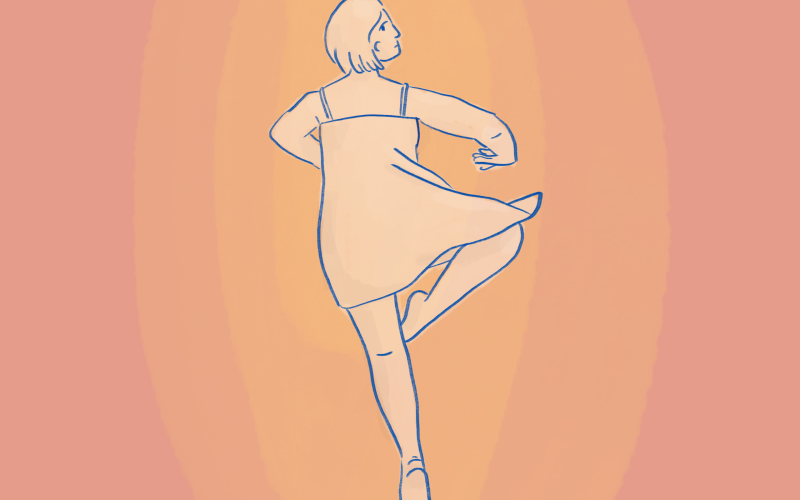When a dancer twirls, their gaze is often fixed on some point in the distance. Their eyes cling to the sight of some chosen, usually stationary, object until their rotating body no longer allows them to, at which point they’ll turn their head rapidly, outpacing the rest of their twirling body, to restore focus on said object. This technique, commonly known as “spotting,” is used to keep their head in a near-steady orientation. This helps prevent them from growing dizzy as their bodies spin and their limbs contort to create mesmerizing pirouettes.
Maintaining this constancy keeps the dancer from getting lost in the chaos of spinning, allowing them to focus their attention on more than just their balance — on the form of their arms, the posture of their torso, the position of their legs. One might conclude that to survive, or maybe even thrive, during turbulence, it can be helpful to have an anchor of sorts.
My first two years here were a dizzying spin of social anxiety, self-inflicted austerity and hopeless fabrication. As it turns out, it’s really hard to address a condition if you spend all your energy trying to convince others (but really, ultimately, yourself) that it doesn’t exist. Without a source of constancy — say, a goal that filled me with a sense of purpose or a stable support network — my balance only worsened, and I eventually stumbled and fell.
Before the fall of my junior year, I decided to take a year away to catch my breath, to get away from the campus and life where I constantly felt underwater. That summer, breathing itself wasn’t at the forefront of my mind for the first time in years, and I found the headspace to relax and actually enjoy life. One year turned into two, two years doubled into four, and years of easy breathing made returning to the water that much more daunting.
When I moved out of my sophomore dorm room at the end of spring quarter four years ago, I had no idea I wouldn’t step on campus that fall or the next fall or the next. I had no idea that when I did finally return, the location of my classes would be URLs and my classmates pixels on a screen.
To an outsider, my experience returning to college this year might appear to be a disappointing one. I can comfortably call one other student (coincidentally, someone who also returned from a leave this year) my friend, as everyone I once knew has already graduated. I have much less time for myself since most majors aren’t designed to be completed in two years; if I’m not reading, I’m watching a lecture, and if I’m not watching a lecture, I’m completing a problem set. Though I’ve joined student organizations, I can’t say I feel integrated into any of them since I find it difficult to form and sustain relationships digitally. And yet, it is not often that I think about all these things — all the ways returning to college during a pandemic that confines me to an apartment 350 miles away can be strange and imperfect.
Rather, I spend most days feeling a bit overwhelmed by how wonderful it is to be a full-time student again, to have the opportunity to consider learning and following my interests my first priority every day, instead of one that comes secondary to responsibilities to optimize and maximize for some corporation, as I did during most of my time away. As other parts of life remain in motion — the quarter races by, the virus continues to spread, the election nears — I find sanity and stability in the blur by fixing my gaze on this point of gratitude for as long as I can.
Just as there are split seconds during each turn when a dancer’s head is no longer in its desired position, there are moments when I lose sight of this point and experience the emotions that come with being a 24-year-old woman returning to college in the year 2020. Some days, it’s feeling like something is missing in the moments that come after ending a lovely Zoom call with someone I’m not sure I’ll ever meet in person. On one occasion, it was regret after listening to Amy Coney Barrett’s confirmation hearings and imagining the future of womanhood right before class began. Sometimes, it’s insecurity and shame that it took me this long to find the courage to return. Other times, it’s feeling frivolous for even feeling some of these emotions, given the state of, well, everything.
I know that if I let myself sit in any of these emotional states for too long, I’ll lose my sense of direction, so I whip my head around to find my anchoring point once again. Though I frequently feel out of place and our collective experiences with Stanford diverge more than ever this quarter, I remind myself we’re all probably trying to do the same thing: maintain some semblance of balance so we can continue turning and turning.
For other imperfect metaphors, say hi at yucindy ‘at’ stanford.edu.
